It’s great when you get a call out of the blue from someone who’s really interested in booking you, isn’t it?
They’ve heard great things from someone they trust, they already have some understanding of what you do and how it fits their needs, and they’re essentially “presold” on the idea of hiring you.
I love it when that happens!
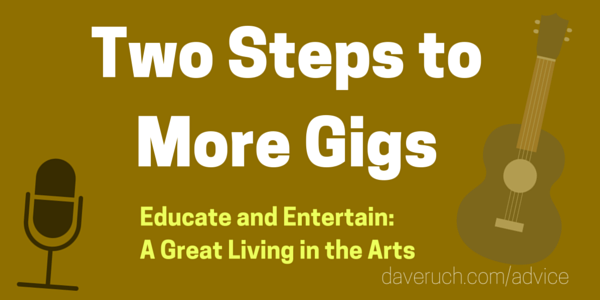 Unfortunately, I can’t fill my calendar with those kinds of “word of mouth” gigs alone.
Unfortunately, I can’t fill my calendar with those kinds of “word of mouth” gigs alone.
Maybe some day…
I’ve also discovered that I can’t really sit around and wait for people to discover me online, or elsewhere – it just doesn’t happen often enough to keep me fully employed.
If the same is true for you, then I guess we’re both left with this unfortunate truth…
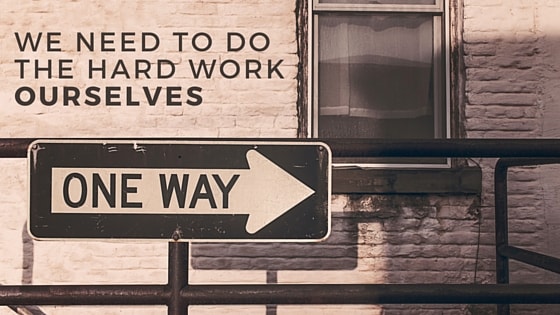 It’s the only way.
It’s the only way.
What’s the hard work?
Well, there’s lots of it, but I can pretty much guarantee that if you do the following two things, you’ll get more gigs:
Step #1 – Find Them
(They probably won’t find you)
It’s a sad but true fact that unless you are a) on the decision maker’s radar already, and b) top of mind at the moment they’re doing the booking, you’re not going to get called for the gig.
 The good news is that you probably already have a good idea of the kinds of places you’d like to be playing or performing at.
The good news is that you probably already have a good idea of the kinds of places you’d like to be playing or performing at.
Try this:
- Break your desired venues down by category or type of gig (school, club, theater, arts center, library, community event, festival, etc.)
- Open a spreadsheet, or grab a piece of paper, and create a list of known venues for each category
- Start compiling contact information for each of them
- Reach out to each venue to make initial contact, and be sure to add them to your email database for future contact and follow-up
- Rinse and repeat
Remember that your list is never complete. Strive to add to it constantly.
Further reference: See the article What Do You Do When You’re Not Performing?
Step #2 – Connect the Dots For Them
This is a big one.
Because it’s so easy to get caught up in trying to make ourselves look and sound “great” in our promotional materials, we often lose sight of what’s most important to the decision maker in that moment they’re reviewing our booking request.
(Hint: it’s not our latest recording, our new promo pictures, or who we’ve opened for.)
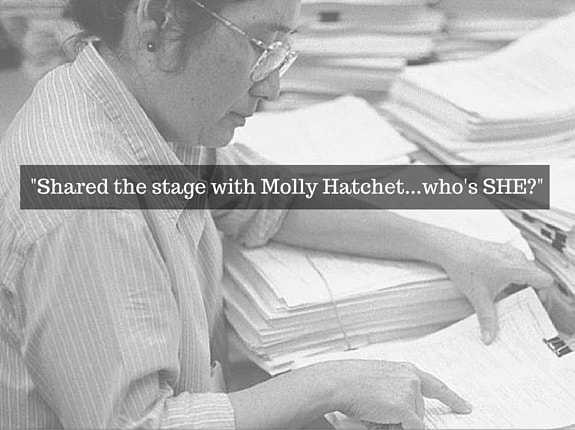 What’s Most Important?
What’s Most Important?
Unless you’re approaching a club or other commercial venue with no built-in audience of their own (in which case putting butts in seats and selling drinks/food is mostly what matters), the most important factor is relevance.
What does your act/performance/show/concert have to do with them?
If you’re a Cajun storyteller and you’re approaching a Cajun storytelling festival for a gig, then there are no dots to connect.
Same for an acoustic blues musician looking for a gig at an acoustic blues concert series.
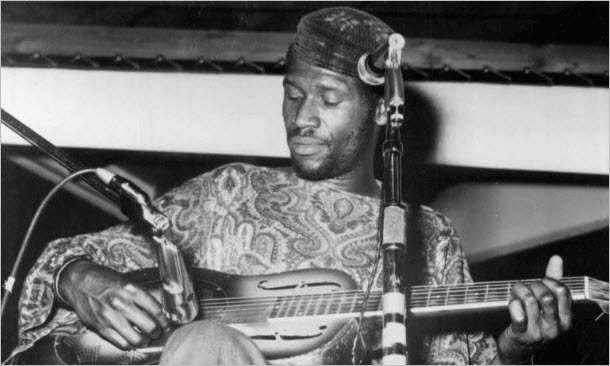 But if you want to make a good full-time living doing this, you’ve probably discovered that you need to reach beyond these very obvious fits and be looking at other opportunities for good paying work.
But if you want to make a good full-time living doing this, you’ve probably discovered that you need to reach beyond these very obvious fits and be looking at other opportunities for good paying work.
(The “Educate and Entertain” blog is full of free resources to help you do that – you can subscribe right here.)
In those cases, connecting the dots for the potential buyer is critical.
Give the people who book those venues something to latch onto.
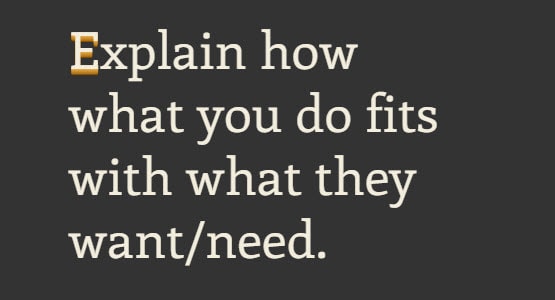 Don’t make them connect the dots or look for a match between their mission and what you do. It just won’t happen most of the time.
Don’t make them connect the dots or look for a match between their mission and what you do. It just won’t happen most of the time.
Here Are Some Examples:
The blues band looking to get out of the bars
There are lots of public venues outside of bars that would love to hire your blues band, and often for very good money. Give them the connection that will make it work – call it “America’s” music (they may be having a Fourth of July event, or an “American Heritage celebration”), or “American roots music,” or mention that the music migrated from the rural south to the urban north if either of those two geographies are relevant to what the venue does or where they’re located.
The storyteller looking to book more shows for adults
Let’s say you’ve got the “kids circuit” wired, and you’re looking to do more telling for adults. There’s a huge market out there – libraries, literary events, speakers series, historical societies, community events, etc. – but if you just approach them as “a storyteller with 30 years experience,” they’ll have no idea what to do with that. Tell them very clearly how your show relates to what they’re doing, or to a current event that would be relevant to their patrons/audience.
The classical music trio looking for more public audience concerts
Maybe you’ve noticed that some communities in your area tend to have outdoor concerts in the park throughout the summer. Those could be great gigs for a classical trio! Listening audiences, good hours, etc. So, what do the people who book those concerts need or want? They want their audience to be happy (tell or show them how you accomplish that), they want to provide variety (that’s you), they may wish to bring some new audience into the fold (you’ll do your best), or offer something that appeals to a wide range of ages (do you? can you?).
Make It A No-Brainer
In every case, tell them why it’s relevant to them.
Give them things to latch onto.
You want them to think “hey, this sounds perfect for us,” rather than “this sounds like a talented group….now, back to the other stuff I was doing.”
Further reference: See the article Want Better Gigs? It’s Not About You
Wrapping Up
So, the two steps again:
- Find them (most likely they won’t find you)
- Connect the dots for them – explain how they can use you to accomplish their goals
I’d love to hear about your experiences with either of these steps, or any others you care to share. The Comments section is below.
[optin-monster-shortcode id=”et6uqxxkfwhak3yq”]
About The Blog
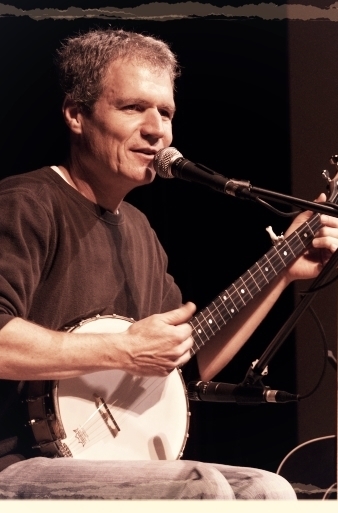 Since leaving a white-collar marketing job in 1992, Dave Ruch has been educating and entertaining full-time in schools, historical societies and museums, folk music and concert venues, libraries, and online via distance learning programs.
Since leaving a white-collar marketing job in 1992, Dave Ruch has been educating and entertaining full-time in schools, historical societies and museums, folk music and concert venues, libraries, and online via distance learning programs.
Along the way, he’s learned a great deal about supporting a family of four as a musician.
The Educate and Entertain blog provides articles, tips, encouragements, and how-to’s for regional performers (in any region) interested in making a great full-time living in the arts.


I’m an author who is lucky to be the free client of a local small business group sponsored by a college. We get free press releases which is huge but better at this point is the databases they have access to and which they offer to us. I’ve received names/ contact info for libraries, military groups, nursing homes w/in 50 mile radius whom I then contact to give my talk about my WWII Tour of Europe. Saves me much time/ effort looking it all up. They are in Excel files which is what I use to keep notes.
Hey Dave-
I can’t tell you how much I appreciate all the wonderful information you share. I have been searching for a simple but thorough template for a Performance Agreement to use when I am hired to no avail. Do you have one that you recommend?
Thanks in advance!
Hi Theresa – there’s a whole article and template right here – Live Performance Contracts
Hey Dave,
I appreciate your articles and all you do to help performers.
Assuming that one reaches out to venues/booking managers by email, what are your thoughts on including in that email a link to a particular song or performance on one’s youtube channel, or attaching one or two mp3 recordings as a demo?
Hi Robert – Good question, and I think it depends entirely on what you do and what kinds of gigs you’re going after. I would say definitely stay away from attachments with your first email, as some small percentage of those will never make it to their intended recipient, and another chunk won’t be trusted if sent to a stranger. Better to put a link or two in the body of the email if (and only if) you think it helps your case. If it’s a venue that cares more about putting “butts in seats,” or making their existing audience really happy, you’re probably better off using that valuable email real estate to show them how successful your gigs have been at other similar venues. Remember that you only have a few seconds to get their attention, and the last thing you want to do is give them a 500 word email with seventeen links to every possible piece of media you have on the web. Nobody’s going to bother with that much work. Make it short, snappy, and enticing and then you can follow up with more info.
Thanks, Dave! What you said makes a lot of sense. I’m glad I asked.
Hi Dave, another great article! Wondering if you can recommend software to keep track of gig contacts, date contacted, results, etc? I’m not a fan of Excel and would prefer something more graphic that’s easy to look at and update. Thanks again, Nina
Hi NIna – I wish I had a great system I could share, but I don’t. It’s a lot of chicken scratch on my desk and calendar. As far as results, you can track that in your email software, but the follow up is ridiculously manual for me. Maybe someone else can help us both!
I use Giggio, an site/app out of the UK. Works well and they are constantly improving it. About $20 a month through Paypal. Just change the flag to United States.
Great article. We can’t expect people to “get it”. Loved the idea of using storytelling to connect the dots.
Hey Joel – thanks for the feedback. It’s always great to hear from a long-time subscriber!
I have read this article and find it very interesting. Thanks for the tips and ways to try to make my carriar move on.
Thanks for reading William!
Oh, forgot to explain what I meant with the “cultural difference” – a thing in Germany called “Kleinkunst”, often managed by volunteers of an registered association. So they don’t have to make profit as a professional venue, but the nevertheless give independant professionals a platform to present their art and to make a living out of playing solo for only 30-50 sometimes 100 people. Those people come to watch and listen to a concert – not sitting at tables having drinks or even talk. The fans and the volunteers spend their time for this wonderful culture because they want to enjoy art beside the mainstream and the blank, mercyless business. They want to listen to artists, that have a great quality but who would never have a chance in the mainstream business. I’ve been a pro now for 29 years and without the “Kleinkunst” my profession would be a lot poorer 🙂
Hey Peter – thanks so much for sharing your experiences in Germany. What you describe sounds very much like the folk club scene here in the USA, and in parts of the UK as well, with volunteer-run organizations, 30-150 people attending a typical event, and a concert-like setting with listening audience who have come for the music,
Hi Dave,
all in all I am with you and your thoughts. One thing is different for me and maybe it’s a cultural difference in the use of digital media. I make a lot of phone-calls because of the same reasons you mentioned. Only puttin venues on an e-maillist for follow-up information seems to be not a good way here. We have a lot of “Kleinkunst”-Venues, which are managed by volunteers organized as registered association. A lot of them told me, they get up to 700 e-mails a week and they don’t know when and they don’t like to read all of them. So the best way for me up to now seems to be to check out the programs of venues, to guess, if my performance fits to the program and the guests and then call the venue, find the decider and give him a shortcut within 30 seconds so that he knows he is dealing with a pro.
One more and more emerging problem is the transparence of the market – for artists a blessing, for venues a curse. Every artist, from the baddest amateur to the best pro can find and contact every venue easily. But the venues would have to check every request looking for the , homepage, for videos and stuff. A lot of them don’t do this anymore without a personal contact, because they don’t have the time, to have a look on all of them.
So my only difference to your notice is the importance of a personal contact and to show in a short, trenchant phonecall or face-to-face-talk, what your USPs are and what you think you can do for this venue with your performance / your art.
Thanks a lot for your ideas, which remind me of looking exactly for what I am doing with my working time – to do the right things (beeing effective) and to do them right (beeing efficient)
…and at least: never forget, why we started to make music. Because it’s fun, passion, fullfilling, soulfood, beauty,……
Stay tuned, Peter
Yes, the venues are swamped with requests, aren’t they? I think making personal contact as you have suggested here Peter would benefit just about any performer here in the USA as well.
Thanks so much for these GREAT tips! I have a question for you. Do you think there’s an advantage when contacting venues in doing cold calls as opposed to email? Or is email easier, because they can look at it when they have a chance?
Or is email easier to put in the ignore pile?
Thanks so much, Dave!!
Hi Elise – I’ve always assumed that calling first, then following up with an email, is probably the smartest way to go, although I don;t do it that way myself! I guess the “cold call” has never felt comfortable for me, so I’ve only done it on rare occasions. What do others think?
Let us know how it goes for you Elise.
Hi Dave, Peter and Elise,
That’s how is it going for me:
– I’m sending mass emails to music venues from time to time. Statistically it works and someone call you if you fit in their program or project. Culture centers, house of cultures, festivals etc. For this moment it’s about 20% of gigs for really good money.
– I’m always looking for new stages, big clubs, venues and call them personally. Sending email after conversation. Then call after couple of days and asking is my email perfectly delivered. Sometimes it takes three or five conversations to have a decision: yes or no. Here important to get in touch with directors, managers, head of program department etc.
Very important: providing database and make notations about: when we talk and who it was, what we talk about, some nuances. And always set the reminder for next date of contact. Sometimes I had up to 100 conversations a week and it could be tricky to have everything in mind 🙂 I’m using Microsoft outlook for this and synchronize all through exchange server with my cell phone.
– Third part is making gigs on our own. Finding the venues and have a profit from selling the tickets. Sometime even rent the club/ small or big concert hall / negotiate free “room” in Townhall from local city department. When all conditions and date are confirmed, it’s time to contact with local media (tv, newspapers, web services) and make as much announcements as possible. It worth to rent some places for posters, send cd to local radio station with asking of media support. If you have nice program and interesting announce, excluding some exceptions, everyone should post something about your concert. They need us as much as we need them 🙂
And here the same game with telephone calls, emails, and control calls, reminders and providing database. When you perform after one or two years at the same city, you already will have a nice contacts in press and don’t need loll for new stage.
Of course it’s short sketch, but that’s how it works for me and my band.
By the way, Dave, thanks to nice service and advices.
Love to read about google alerts, that will be new great tips for me!
Glad to hear it!
Thanks for sharing Andrey! You make a great point about making sure we keep good notes and set reminders for follow-up.
Thanks again for the suggestions / tips / help. Always relevant advice.
Right now, I am working on a library show for kids (first one booked in October) & planning to push right into booking in schools.
Plus, I am gathering local songs for a show with an Ohio history slant to it.
‘Appreciate your blog–always gets me to thinking about how to expand / improve.
Love it, Steve! Have you come across Mary Eddy’s work on traditional songs from Ohio? Anne Grimes is another woman who collected songs in Ohio.